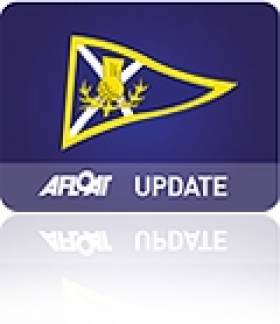Displaying items by tag: Lough Fyne
Monday Promises Better Sailing on Loch Fyne
In the strong conditions on Loch Fyne from early morning, prudence prevailed in many classes where a large number of crews decided to forego racing today, while for others finishing in itself became a problem.
Among the damage the X332 Equinox lost its mast whilst on the way out to the start line, while owner-skipper Charles Frize was thrown into the water from his Class 1 Mills 36 Prime Suspect when it was knocked flat by a huge gust whilst under spinnaker. He was picked out of the water by another competing yacht unharmed but decidedly chilly.
"I don't really know what happened but the bow of the boat dug in all the way to the mast and we seemed to trip over. I went out one side of the boat and came up on the other so I think it more or less went over me," recalled Frize. Prime Suspect was one of three boats which did not finish in the 10 boat class.
As the regatta moved into its penultimate day of racing there is now no boat in any of the classes still bearing a full hand of aces. Having won their first two races in CYCA Class 6, going into yesterday's 16 miles windward-leeward round the buoys race in the north of Loch Fyne, Alan Dunnet and crew on their Gourock based Swan 36 Valhalla of Ashton had to settle for a second place. After just over two hours and 10 minutes of racing and winds between 25kt and 44 kts only nine seconds separated the top three boats with Cara of Kip, Graham Goudie's powerful Moody 336, triumphed with Valhalla of Ashton.
"I don't think we really did anything wrong so it is difficult to know where we lost out, but it was certainly an exciting day," commented Dunnet.
The IRC Handicap classes, which were limited to one short race, saw a wrong spinnaker selection and some ill-timed luck let the south coast of England based Mills' designed King 40 footer Tokoloshe get the better of double Scottish Series Trophy winner Anthony O'Leary and his crew on Antix.
"We got to the windward mark and set an asymmetric kite and the next five minutes were the lightest of the day and we were going nowhere fast," recalled O'Leary later. The win for Michael Bartholomew's King 40 today eases them one point clear of the Cork crew on Antix. Three times Scottish Series Trophy winner Jonathan Anderson on Playing FTSE is top Scots skipper but suffered today when a their headsail halyard failed and the sail came tumbling to the deck.
In IRC Class 3 Steve Goacher, another past Scottish Series winner, is closing on the current top trophy holding crew of Salamander XX. John Corson's crew on Salamander XX lost control a couple of times on the downwinds and finished seventh today, while Goacher, steering Keith Lord's A35 Acrewed Interest finished fifth and now lies only two points behind Salamander XX on the overall standings.
And in IRC Class 4 it was the Forth based crew on Hops, the evergreen Davidson 36 IOR design which won ahead of Jackaroo, Hamish MacKay and crew on the class leading J97.
But with a second place today, now counting two first places and two second places, Jackaroo already leads their 14 boat division by nine clear points.



























































